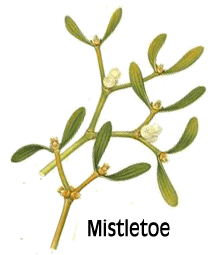 What is Mistletoe?
What is Mistletoe?
Many know Mistletoe as a Christmas time favourite, and for many is associated with the modern notion of sharing a ‘kiss under the mistletoe’ . Mistletoe is much more than this though and is a key ingredient in many herbal medicines.
Mistletoe (Viscum album) is a parasitic plant that grows on several types of common trees which include apple, oak and pine trees to name a few. Native to Europe and Asia, the leaves and stem of the mistletoe plant are used within herbal remedies.
Mistletoes Herbal Remedy History
Mistletoe extract has been used since ancient times to treat illnesses and infections. Mistletoe teas and herbal remedies used for centuries have been used to treat headaches and dizziness, which are still used today!
The history of mistletoe in herbal medicine practices dates back almost 300 years, where it’s been recorded as a treatment for epilepsy. Covered in our herbal medicine courses, mistletoe has been used in the past to treat hysteria, urinary complications, cardiovascular issues and other problems associated with the nervous system.
Women would be advised to treat menopause symptoms by drinking mistletoe to normalise circulation, counter hot flushes, feelings of anxiety and heart palpitations. Mistletoe can also be used to stem the flow of blood both internally and externally. In some parts of Europe mistletoe extract is prescribed to cancer patients as a herbal alternative and can be commonly found in supplements, liquid extracts, teas, and powder.

Benefits of Mistletoe
Mistletoe has been studied by many scientists and doctors to understand its amazing capabilities to reduce high blood pressure. In particular, herbal remedies incorporating mistletoe have been able to significantly improve headaches and dizziness connected with high blood pressure.
Herbal remedies use the power of mistletoe to strengthen the heart and reduce high blood pressure. This is considered one of the best remedies for heart and circulatory discomfort, and can even be used to reduce some side effects from particular cancer treatments.
Medicinal benefits of mistletoe continues to grow, as it’s a recommended treatment for side effects of abnormal blood pressure, to decrease symptoms of:
- Blood rushing to the head
- Dizziness
- Buzzing in the ears
- Visual defects
Benefits of Mistletoe Teas
Before you use mistletoe to treat high blood pressure and other diseases, it’s important to know how to prepare mistletoe for herbal remedies. Mistletoe should always be made as a cold infusion, as heat destroys the plant’s medicinal properties. If you’re unsure if mistletoe tea is suitable for you, speak to a health professional.
Paired with valerian, mistletoe can make a great remedy for nervous dyspepsia. Highlighted in ancient times and still believed today, a herbal tea with mistletoe and valerian can help relieve menstrual cramps and epilepsy symptoms.
Herbal teas use elements of the plant which can include flowers, roots and leaves chosen for their unique health benefits. Elderly people who have high blood pressure and are in danger of a stroke can protect themselves by taking 2-3 cups of mistletoe tea daily. Mistletoe tea is beneficial for more than just high blood pressure.
Mistletoe Tea Recipe
This mistletoe tea is suitable for vegans and gluten free allergies, however it should only be consumed by adults. This tonic recipe is also great for preventing heart irregularities with herbs:
- Blood rushing to the head
- Dizziness
- Buzzing in the ears
- Visual defects
Prepare the mixed herbs as a cold infusion and drink one cup before breakfast and one cup in the evening.
Interested in learning more about the cardiovascular system, its functions, related disorders and herbal treatments? Join our Cardiovascular & Lymphatic Systems Lesson 6 online now! Contact us if you have any lingering questions about mistletoe.
